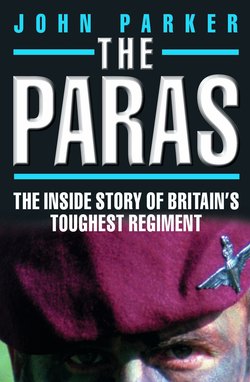Читать книгу The Paras - The Inside Story of Britain's Toughest Regiment - John Parker - Страница 6
На сайте Литреса книга снята с продажи.
INTRODUCTION
ОглавлениеFormed at the personal insistence of Winston Churchill in Britain’s darkest hours of World War II, the then Prime Minister demanded a force of 5,000 to take the war to the Germans and they went on to cover themselves with glory. Eventually, more than 100,000 men were enlisted into the para battalions, dropping into virtually every major campaign of the conflict in perilous conditions in which the chances of survival were slim. They rapidly built a reputation for deeply penetrating enemy lines, parachuting en masse and later with airborne forces to bring in their own heavy metal. They were men who got their first, notably in the capture of Sicily and the D-Day landings. Their 6th Airborne Division led the glider-borne raid and capture of Pegasus bridge in Normandy in the dead of night on June 6, 1944, immortalised in the film The Longest Day. And, perhaps most famously of all, they were given the desperate task of capturing The Bridge Too Far, at Arnhem, a catastrophic military misjudgement which cost the lives of thousands of their brethren.
Although down-sized after the war, and through later defence cuts, the Paras have never been out of action since they were formed. In the savage ‘wars of peace’ in the second half of the 20th Century, during Britain’s exit from her colonial empire, they were immediately back in the front-line of major conflicts and firefights. They led the British army into Palestine in the 1950s and 60s, they were heavily committed to the disastrous attack on Suez, fought Greek terrorists in Cyprus, Communist guerrillas in Malaya, Borneo and Aden, and in more modern times fought the toughest of all battles in the Falklands War in 1982. The Parachute Regiment has also been on continuous duty in Northern Ireland since the troubles began in 1969, suffering a large number of casualties. They became particular targets of the IRA after their involvement in the appalling tragedy of Bloody Sunday, about which controversy rages to this day.
Their role has changed with the times, more as interventionists in conflagrations far and wide but they remain every military commander’s first choice as the lead contingent with skills, honed in World War II and modernised to meet today’s needs, that are as vital as ever. They are learned in the toughest of all military training regimes in the British Army. One of their favourite catch-phrases is ‘Train hard, fight easy’ and they do it their own way. Their own training company is led by officers who become expert in rooting out recruits who either do not have the physical or mental stamina to survive battle conditions or whom conversely show too much bravado. They need to be as hard as iron, but cowboys, dare-devils and risk takers are no use to anyone in a critically honed unit of men. They are young men who, despite the image, are not supermen, and that is no better demonstrated than in the recollections of a young officer recalling later in these pages a firefight during the Falklands war:
‘We got up on to the mountain and amongst the enemy before they knew we were there. Even so, the ferocity of their response set us back on our heels. I had 39 men in my platoon, five were killed and eight wounded straight away. People were not shouting “Bang! Your dead.” People were falling down for real. That was the shock… the reality of it. The bullets were flying and they were real; they were coming at us from machine guns and snipers. That was the shock, the reality of it. The second person to get hit was the medic. He died in our arms… we just watched his life drift away. Another guy who was shot finished up in a perfect place for us to take cover. We were sitting on him most of the night. He was dead but it was a ghastly thing… Three of my men sacrificed their lives trying to help the wounded… the self-sacrifice and camaraderie my soldiers showed that night was the most religious thing I have every seen. One of them… a quiet 29-year family man was killed in what was a virtually single-handed attack on enemy positions to save his colleagues. He was awarded the Victoria Cross, posthumously.’
This quotation draws us to another equally important aspect of the Paras story, the reason I begin these chapters with the words of the widow of one of their dead heroes. Her recollections prove that tough and renowned they may be –the Paras still bleed.
John Parker, February 2002
